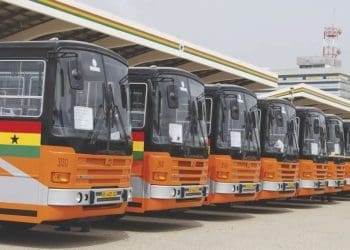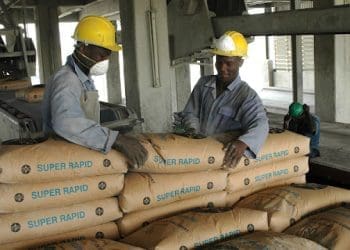The Minister for Works, Housing and Water Resources, Kenneth Gilbert Adjei, has called for stronger collaboration among government agencies, industry players, and local authorities to tackle the growing problem of encroachment in quarry and sand-winning zones.
Speaking through his representative, Rev. Stephen Osei, at a cross-sectoral forum on Encroachment, Challenges in Quarrying and Sand-Winning Zones organized by the Ghana Chamber of Construction Industry, the Minister describing the issue as a “crisis with far-reaching consequences.”
He noted that the illegal sprawl into prime quarry and sand-winning areas is driving up construction costs, disrupting project schedules, and threatening the delivery of affordable housing.
“Among the gravest of these challenges is the encroachment and disruption of designated quarry and sand-winning zones. This is not just an inconvenience—it is a crisis,” Rev. Osei stated on behalf of the Minister.
The forum brought together government officials, regulators, and industry players, to explore solutions, including stronger enforcement of zoning laws, stakeholder collaboration, and investment in sustainable construction materials.
He noted that the cost of transporting aggregates—essential materials for construction—has risen by as much as 23 percent due to the displacement of contractors from established quarry sites.
In some areas, contractors now travel more than 40 kilometres further to source materials, a situation that inflates budgets, delays project delivery, and undermines investor confidence in the sector.
“These figures are not mere statistics. They represent homes not built, infrastructure delayed, and opportunities lost,” he stressed, warning that Ghana cannot afford such setbacks at a time when the government is working to bridge the country’s housing deficit.
The Minister, through his representative, outlined a series of measures to address the challenge, urging collective action from relevant institutions.
He called on the Minerals Commission and the Lands Commission to work with his Ministry to map and safeguard critical extraction zones, while tasking the Environmental Protection Agency and the Ministry of Environment, Science, Technology and Innovation to strengthen environmental safeguards and promote sustainable alternatives to natural aggregates.
He further urged Metropolitan, Municipal, and District Assemblies (MMDAs) to enforce zoning regulations at the local level to prevent further encroachment.
Beyond regulation, the Minister emphasized the need for innovation, stronger monitoring systems, and private sector partnerships to build a resilient and sustainable construction industry.
“The task ahead demands boldness, unity, and urgency. It is only through strong partnerships between government, regulators, local authorities, industry players, and communities that we can protect our resources, reduce cost pressures, and restore efficiency to our project delivery systems,” he said.
The Chief Executive Officer of the Ghana Chamber of Construction Industry, Emmanuel Cherry, also added that the encroachment crisis is pushing the cost of housing and road construction to alarming levels.
He explained that issues around aggregates and quarry operations had surfaced earlier during the Ghana Investment Trade Week in July, where stakeholders raised concerns over rising construction costs.
“Each government keeps saying affordable housing, but the question is, how affordable are those houses if the cost of aggregates continues to rise astronomically?” he asked.
The GhCCI CEO also expressed concern over landowners and, in some cases, government actors selling off quarry-designated lands to private developers, including expatriate companies, at the expense of local operators.
This, he said, forces quarry operators to relocate farther from urban centres, compounding transport costs and threatening the competitiveness of Ghana’s construction industry.
Calling for urgent action, he urged the Ministry of Local Government to support assemblies in developing local plans that clearly earmark areas for mining, residential, commercial, and recreational purposes to prevent indiscriminate land use.
The Executive Chairman of the Commercial Quarry Operators Association, Dr. Ebenezer Mireku also warned that the survival of the entire quarry industry is at risk if government does not act decisively to curb encroachment and other systemic challenges.
He cited three major problems facing the sector: the rise of “development quarries” set up by large contractors—often foreign—who bypass local operators; the growing activities of non-compliant operators who flout regulations; and dollar-based charges imposed by regulators even though operators transact largely in cedis.
“These challenges are squeezing operators. We collect cedis from sales, but many of our charges to the Minerals Commission and EPA are in dollars. This creates serious cost pressures,” he explained.
On the encroachment crisis, Dr. Mireku was emphatic that nearly all quarries across southern Ghana—stretching from Greater Accra through Eastern, Volta, Central, Western, and up to Ashanti—are under threat.
“Our operations encapsulate hazards, and that is why the law requires a 500-metre buffer zone around quarries. But today, people are building within 10 to 20 metres of blasting zones.
This is dangerous for human life and forces quarries to shut down prematurely, burying billions of cedis worth of reserves,” he said.
Dr. Mireku stressed that granite is a strategic national resource that underpins all infrastructure projects, from housing to roads.
“Everywhere the President goes, citizens demand roads. But no road can be built without aggregates. If we continue this way, Ghana may one day be forced to import aggregates, which would be disastrous,” he cautioned.
He urged government to enforce existing laws, protect designated quarry zones, and treat aggregates as a vital national resource critical to job creation, infrastructure development, and the reduction of Ghana’s housing deficit.












